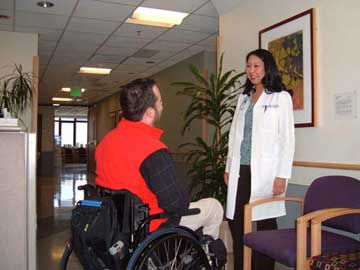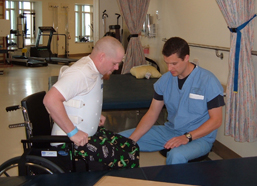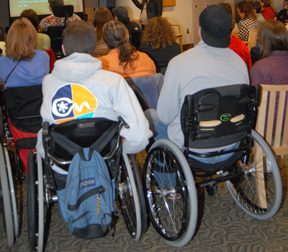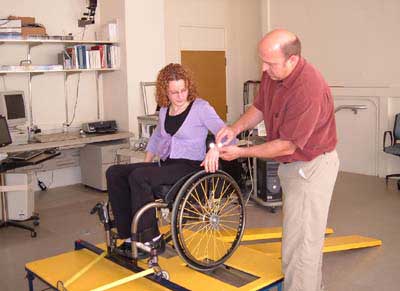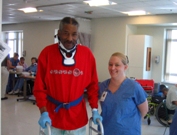Spinal Cord Injury Update
Fall 2008: Volume 17, Number 4
What will my life be like after spinal cord injury?
New
documentary short Moving Forward after SCI was made to help newly injured patients
imagine a hopeful future
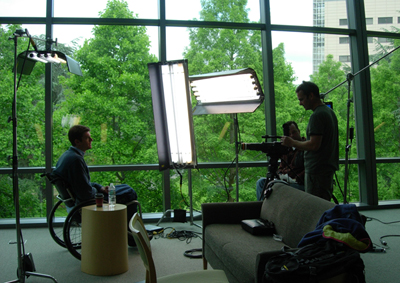
Kyle Carver (standing far right) runs the camera while Chris Garbaccio (seated right) interviews Billy Price (left). The setting is the UW Medical Center Surgery Pavilion.
Working with newly injured SCI inpatients at Harborview and UWMC, rehab staff often see them struggling to imagine what their lives will be like with a spinal cord injury. They dutifully learn all the new self-care skills required to stay healthy and function as independently as possible, but what about everything else? We frequently hear, “All my expectations and assumptions about what a normal life is—they don’t apply anymore.” It can be terrifying.
The truth is that people with SCI can go on to do the same things that make life fulfilling for everyone, including careers, friendships, marriage, children, and participating in activities they enjoy. But it’s hard to picture these things for yourself while lying in your bed in the rehab unit, no matter what rehab staff and people “on the outside” tell you.
Thus was born the idea for a series of short videos showing people with SCI living lives that include all the “normal” stuff: work, family and friends, sports, an active social life, owning a home, driving a car, etc. With funding from the National Institute on Disability and Rehabilitation Research (NIDRR, grant #H133N000003) and the Craig H. Neilsen Foundation, as well as considerable volunteer time from several key players, the Northwest Regional SCI System (NWRSCIS) recently completed the “pilot” in the series. It features Billy Price, whose life was upended 12 years ago when he sustained a C-6 complete SCI as a freshman in college. As he narrates his journey with SCI—the traumatic early days, the challenges and achievements—we see on the video screen images of his present day life: driving to his full-time engineering job, doing laundry in his condo, laughing with friends at a football tailgate party, and whizzing down the ski slopes.
“It’s a message of hope,” says Jeanne Hoffman, UW rehab psychologist and NWRSCIS co-director. “Life isn’t over. You really do move on. While our peer mentor program (which pairs newly injured SCI patients with SCI ‘peers’ who are successfully living and working in the community) goes a long way toward showing inpatients that a satisfying life is still possible after SCI, we thought it also would be helpful for them to actually see what life with SCI could look like after moving on from rehab. This video can benefit anyone struggling to imagine what ‘normal’ can look like.”
Creating even a short seven-minute video took many hours of planning, shooting, editing and re-editing. “Because our budget was quite small, we had to rely on the good will of professionals who wanted to be a part of a worthwhile project and were willing to waive most of their fees,” says Chris Garbaccio, SCI peer mentor coordinator with the NWRSCIS, who helped produce the video. This included Kyle Carver, a Seattle-based director/cinematographer whose company, Free Road Films, makes documentaries, and editor Bruce McCoy of Big Time Film and Video. “We are immensely grateful for their generosity and enthusiasm.”
Billy Price, the “star” of the video, cheerfully volunteered his time and welcomed a camera into his work, home and social life. “I couldn’t say ‘no’ to such a worthwhile project,” Price says. “People helped me after my injury, and I welcome opportunities to try to help others going through this kind of ordeal.”
The NWRSCIS hopes to produce a video for several different injury levels. “We decided to start with C-6 because it is such a common injury,” Garbaccio says. “If we can find the funding, we’d like to produce videos showing people with both higher and lower injuries so they relate more specifically to patients with different injury levels.”
At the UW and Harborview, the Moving Forward video will be shown to SCI patients undergoing rehab. In addition, faculty will use it as a training tool for graduate students and medical residents in the Department of Rehabilitation Medicine.
Click this link to watch the video: http://sci.washington.edu/info/video-moving_on.asp
For more information, or to obtain a copy on DVD for your institution or group, contact Cynthia Salzman at

